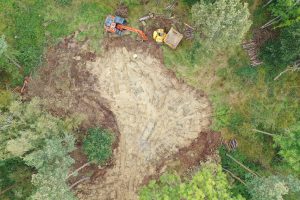£88,000 NEIRF grant to benefit freshwater wildlife, developers and landowners
18th August 2022
Freshwater Habitats Trust is a co-recipient of an £88,000 grant from the Natural Environment Investment Readiness Fund (NEIRF). The grant has been awarded to the Newt Conservation Partnership, NatureSpace Partnership, Amphibian and Reptile Conservation and Freshwater Habitats Trust, to use ponds to reverse the rapid decline of freshwater biodiversity.
The partners will create an integrated scheme for developers to meet legal obligations for wildlife habitat protection, including new biodiversity net gain regulations due to come into force from 2023. This will streamline the planning requirements for developers and could provide significant time and cost savings.
The NEIRF grant, which is Defra funding administered by the Environment Agency, is to help enable the project to get to a point where it can attract private investment to provide Freshwater Biodiversity Credits, for use in the Biodiversity Net Gain market, that will simultaneously ‘stack’ alongside investment under great crested newt species licensing.
This new approach to working with developers will support the partnership to create and restore small water bodies and wetlands at more than 500 sites across Oxfordshire and Buckinghamshire by 2030 and will enable the team to monitor the sites for the next 30 years. This will include measuring numbers of freshwater species, carrying out regular water quality testing and developing new methods for evaluating the role small water bodies have in mitigating against the impacts of climate change.
A growing body of evidence shows that unpolluted ponds support more biodiversity than rivers and lakes, including a greater number of endangered species, and are critical to maintaining landscapes that are rich in freshwater wildlife.
This will build on the substantial progress already made as part of the NatureSpace District Licensing Scheme, delivered through the Newt Conservation Partnership, in creating new high-quality wildlife habitats. The scheme is available to landowners and developers across more than 50 local authorities in the Midlands and the south of England to provide habitats for the great crested newt.

Developers working on sites where great crested newts could be present are legally obliged to obtain a licence to make lawful any works which impact newts and/or their habitats. This ensures that great crested newt habitats are protected or any lost habitats are compensated for with the creation of new clean water ponds. Within the NatureSpace scheme this also includes compensatory terrestrial habitat delivery.
Government policy currently states that a development should provide biodiversity net gains – an increase rather than decrease in wildlife habitats. This is due to become mandatory from November 2023, with the introduction of biodiversity net gain regulations through the Environment Act. The new integrated scheme will enable developers to meet these regulations, alongside securing the use of district licensing for great crested newts.
NatureSpace CEO, Dr Tom Tew, warmly welcomed the grant award, saying: “This is another exciting step in the journey to create systems that provide huge value for both developers and planners, whilst focusing on nature recovery across the landscape with the creation of thousands of brand new high quality freshwater ponds.
“By creating new income streams, we are moving from ‘death by a thousand cuts’ to a new paradigm of ‘landscape recovery through a thousand stitches’. We are enormously grateful for Government support to kick-start the new investment models”.
Freshwater Habitats Trust CEO, Jeremy Biggs, who is also a co-Director of NCP said: “Protecting small waters and wetlands is essential if we are to reverse ongoing freshwater biodiversity declines and deliver 25 Year Environment Plan goals for freshwater. Ponds and other small water bodies have been undervalued by scientists and policymakers for the last 100 years. Together, however, they support more biodiversity than large water bodies and, because they are easier to create and restore, they represent a golden opportunity for us to provide habitats for wildlife as we adapt to climate change. We’re absolutely thrilled that this funding recognises their potential for reversing the decline in freshwater biodiversity.
“The Natural Environment Investment Readiness Fund grant has come at an important time, as Freshwater Habitats Trust starts to create a national network of wilder, cleaner, connected freshwaters to reverse the long decline of freshwater wildlife. This funding will provide a significant boost as we embark on building the Freshwater Network to provide freshwater wildlife with the unpolluted habitats it needs to thrive.”
Amphibian and Reptile Conservation CEO and Co-Director of NCP Dr Tony Gent said: “Ponds are vital habitats for amphibians, and we need to turn around their fortunes after decades of pond loss. This pioneering project will test how emerging mechanisms can create high quality ponds, thereby benefitting our frogs, toads and newts. Protected species have sometimes posed dilemmas for developers and regulators, but new changes to legislation and policy give us an opportunity to improve prospects for amphibians, while improving procedures for those involved in land use change.”
